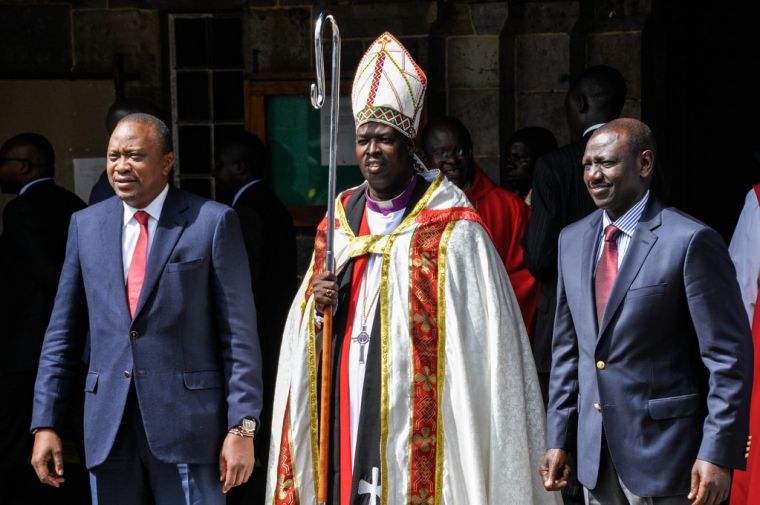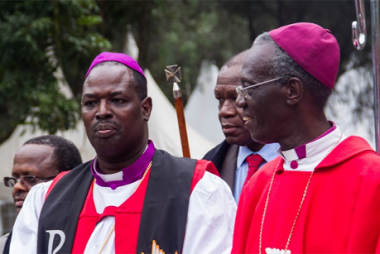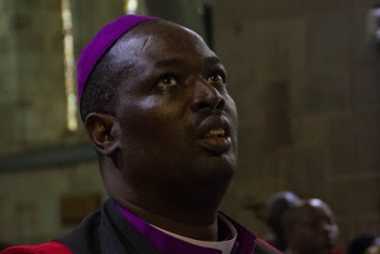New Archbishop of Kenya will fight for the future of his church, his country and its young

The new Archbishop of Kenya is spoken of by friends and admirers with not so much shock as a considerable amount of awe.
One reason is because this large, strong and unqestionably holy man is from the influential Masai tribal group - a warrior tribe which the charisma of the new primate's presence personifies. His mother was the seventh of his wealthy father's 11 wives.
But his father died when the young Sapit was four and the younger wives were sent away, meaning he spent the rest of his childhood in poverty.
He was saved by the charity World Vision which sponsored him through his education.
So this Masai has known life at both ends of the social spectrum. And as Archbishop, he will be fighting not for land, or property - but for the young people of his country, for justice and compassion, and for the Gospel of Jesus Christ.
Dr Jackson Ole Sapit will be part of the primates' council of the conservative Global Anglican Futures Conference, or Gafcon, but he has made his position significantly clear.
In common with most of the African Anglican provinces, he will maintain an orthodox stance on issues such as marriage.
But he will not support any move, however slight, to leave or break apart the Anglican Communion.
"He has presence, great personal warmth, courage and is genuinely godly and not a political operator," said one English church leader who knows the Archbishop and province well.
Like the Archbishop of Canterbury Justin Welby, who was among thousands who travelled to All Saints Cathedral in Nairobi for his enthronement, Archbishop Sapit will use his position to forge greater unity around the disagreement that all accept will exist for the forseeable future.
Archbishop Sapit, former Bishop of Kericho, who in 2002 moved to Reading in the UK for a year to study for an MA social development and sustainable livelihoods, spoke at his enthronement of the importance that the Anglican Church in Kenya remain true to her calling.

"A lot of questions are being asked about the role of the church in the world today. If Christians form 80 per cent of our population, why the corruption, the environmental degradation?"
"These vices compromise our future as a church. We need to reach out to the poor and outcasts and help them meet their various needs because this is the essence of mission and the core business of the church."
Before creating a robust strategy for mission, the church must redefine its role and also look at its capacity for mission," ACNS reported.
The church has huge numbers of people. "Taking stock of this manpower is key for us to utilise it," he said.
He urged the Kenyan President to consciously work out the kind of country they want to work towards. "Only then will our beloved country be healed and cry no more."

Archbishop Welby said: "In the world we live in there is tribulation, and as Archbishop you will find tribulation from the world around you, and one which this country is very familiar with – suffering, terrorism, cruelty and brutality. But you're the voice of peace and hope against such troubles, and we are of much cheer because Christ has overcome the world."
Earlier, the new Archbishop told Zimbabwe journalist Bellah Zulu that his journey to becoming Archbishop of Kenya began as a young man, when he met a missionary from England who was running a mobile clinic and set up a small Anglican church." He became her interpeter and also started cattle trading, walking animals from the village to Nairobi, a journey that would take us about seven to eight days.
He also joined a group that invited the government to establish a school in my community which gave him an opportunity to teach young Masai warriors how to read and write when they were back from herding cattle in the evening. "This was the beginning of my passion to see other people grow and improve."
Children and the youth will be key areas of his focus as Archbishop, because of his passion for a better future for this country and the world.
"If we're to create that future, we need to pay special attention to our children through moulding and training. Young people in this country and the world at large are facing a lot of challenges such as alcohol and drug abuse which is ruining the fabric of our society. In addition the emergence of other cultures due to globalisation entail a growing need to come up with programmes which give young people proper focus in life. After all, they're the leadership in waiting and our future depends on how we mentor them."
He believes God is going to do greater things. "This is a journey of growth and faith. I want us to grow from where the church is, to a greater church of love and faith. A church that's going to love and care for the community, and also one that will be passionate about moving our country forward in terms of mobilising communities for social development."











